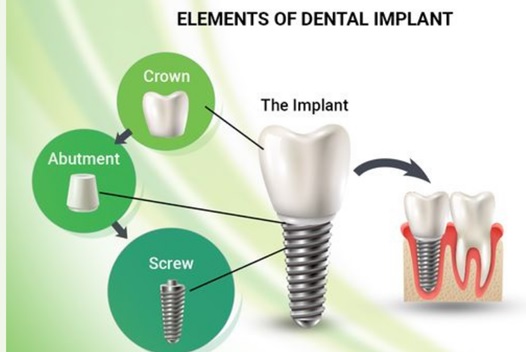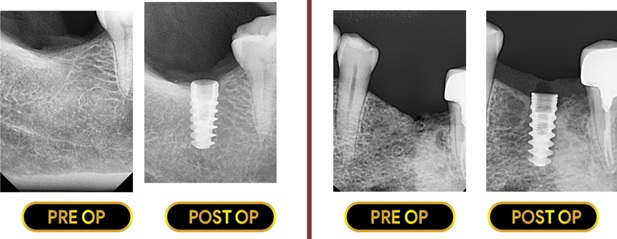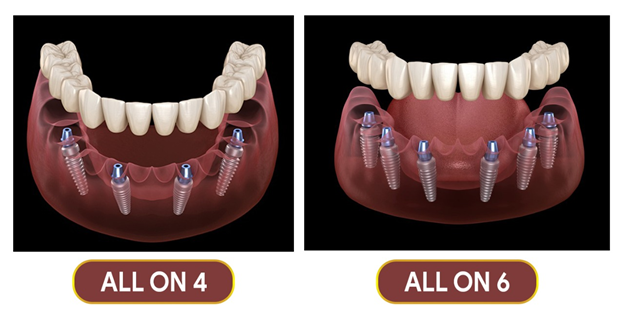Dental Implants

Dental Implants:
Dental implants are biocompatible metal posts or frames that are surgically inserted into the jawbone beneath the gums. After it fuses into the jaw bone over a period of time, the dentist can mount the replacement teeth onto them. It looks and lasts like the real tooth. A Tooth implant is the best replacement for a missing tooth which is a prototype of a natural tooth root.
WHY DENTAL IMPLANTS?
One can face the problem of missing teeth in their life. Tooth loss can be because of trauma, accident, serious gum diseases, tooth decay, or even poor oral hygiene. If not treated missing teeth can cause various consequences such as
- Speech problems
- Chewing problems
- Face may look older and wrinkled with sunken
- Pain in the facial muscles of the jaw
- Tooth decay and gum diseases
- Improper bite because of a tilt of adjacent teeth into the emptied spaces
- Untreated missing teeth may dent the facial expressions
- Hiding smile during discussions or at public gatherings
Dental Implants help to overcome the above-mentioned problems. There are the best, popular treatments for the replacement of missing teeth. Dental implants are perfect for people having missing teeth regardless of their age and sex.
With a 98% success rate, implants guarantee dental patients about their teeth and gum’s wellbeing.
Dental Implants are importantly a ‘titanium screw’ fused with the Jaw Bone.
Advantages:
- Dental Implants help restore the missing tooth
- Implants are a long-lasting solution with the ability to outlive the patient
- Dental Implants help to maintain the shape and contour of the face and smile
- Implants never harm the adjacent tooth structure
- Implants guarantee superior appearance and comfort with speech
- Implants boost your confidence for being an ideal solution
- Implants give the opportunity to make the most of your favourite foods
Implant Procedure:
Implant placing has various stages

Placing The Implant
Thanks to modern dentistry methods, it’s easy to make the implant placement comfortable and pain-free. Patients can also request the dental specialist for sedation to feel relaxed while dental implantation.
The process starts with the jawbone preparation and the surgeon makes a cut to uncover the bone for drilling holes. The gaps are kept deep enough for the implant to be placed properly and deep into the bone, similar to the root.
The dentist may require bone grafting in cases where the bone is weak or does not have the strength to support implant surgery. The dentist waits for the jaw bone to heal and then places the metal post in it.
The whole cycle may take few months where most of the time is spent on healing and waiting for the development of new bone in the jaw.
After this, a temporary crown is given to the patient to fill the hole and also for achieving the aesthetic goal. This crown can be taken off for the implant process, one needs to hold up until the bone is healed completely.

Healing
During this process, the jawbone will grow and unite with the dental implant surface. This process is also called to as osseointegration as it helps a solid base for the new artificial tooth, much like roots do for the natural teeth.
In general, this may take between 3 to 6 months depending upon the bone health and structure. However, the complete process can be completed in a single day if the patient has a good bone structure.
From that point onward, you can plan the second surgery but just once the implants are fused with the bone. Your dental specialists will take an x-ray to confirm whether the implant is good for the subsequent surgery.
The second surgery will be less difficult than the first where a new incision is made to uncover the heads of the implants.
Abutment Placement
You may also need a second surgery to place the abutment (the piece where the crown will join) but only after healing is completed. This process is relatively simple typically completed with anesthesia in an outpatient setting.
During the process, the dental specialist will re-open the injury to join the abutment to a dental implant. A temporary crown will be given for 4 to 6 weeks to let the gums around the abutment heal. Such a crown is mild and can cushion the implant and may pressure the delicate tissues that can help in healing.
For precaution, you may need to eat soft foods after each phase of surgery so to let the surgical area heal properly.
Placement Of Permanent Crown
In the following stage, the dentist will focus on making the permanent crown look precisely like your normal teeth. All the components like the surface, color, and anatomy will be tuned to blend with the surrounding dentition.
If not satisfied with the crown in any way, consult your dental specialist so it can be sent back to the dental expert for required changes.
Impressions of your mouth and remaining teeth are taken to make the crown so a realistic-looking artificial tooth can be made. The crown, in any case, won’t be placed until the jawbone is sufficiently able to support the new tooth.
It takes under 2 to 3 weeks to make a permanent crown which will be cemented or screwed to the Implant.
After permanent crown placement, your dentist will explain post-implant care guidance.
Post-Operative Instructions For Dental Implants
Follow these post-operative instructions after Dental Implantation:
- Avoid touching, spitting, or rinsing the injury on surgery day. Try not to touch the metal healing abutment jutting through the gum tissue.
- After implantation, it’s normal to have some bleeding or redness in the mouth for 24 hours. To control excessive bleeding, bite on a cloth pad (placed on the wound) for 30 minutes. In case if bleeding doesn’t stop, look for additional instructions from your dental specialist.
- Swelling is normal after surgery. To limit it, apply an ice pack on the cheek in the surgical area (you can also use a plastic sack or an ice-filled towel). Apply the ice as much as possible for the initial 36 hours.
- Drink a lot of liquids but avoid hot beverages. Stick to a soft diet on the surgery day. You can return to the normal diet once the surgical area is healed. Try not to drink anything using a straw.
- Start taking pain killers as soon as you feel the impacts of the local anesthetic are going down. However, take the medicines recommended by the dentist.
- Healing is not possible without oral hygiene. Use the prescribed oral rinse while the day after surgery, use the recommended oral rinse twice after breakfast and before bed. Rinse for at least 30 seconds and then spit it out. Use warm salt rinses at any rate 4-5 times each day too. Be gentle initially while brushing the wound to not affect the healing.
- Try not to use, or consume, tobacco items in any form or any type after implants. It not only hinders healing as well as increases the odds of implant failure.
- Try not to take part in practice following the surgery or keep it minimal, at best. You should realize that exercise may cause bleeding or throbbing, and it truly happens, stop the activity immediately. This may weaken you since you’re not taking normal food.
- Healing abutments will be placed at the time of implant placement. So, do rinse them frequently and keep them clean. Wait for the stitches to dissolve and clean the abutments through smooth massage.
- Try not to use incomplete or full dentures or flippers following surgery or for 10 days afterward at least.
Post-Implants Care
Good oral hygiene is important not only for your teeth and gums as well as for general. Follow these tips to improve your oral health:
- Brush twice a day
- Choose your toothbrush cautiously
- Change your toothbrush after every 2 or 3 months
- Go gentle and thoroughly and don’t use an excessive amount of power while brushing
- Floss at least once every day to keep plaque, bacteria, and foods struck between the teeth out as it helps keep implants in good condition
- Take proper oral care at home to make your dental implants forever
- Use mouth rinses once daily after meals
- Try not to eat sticky foods as implants can draw more bacteria
- Eating and drinking right can enable your implants to avoid harm’s way
Visit the dental clinic regularly and try to achieve good oral hygiene to make your implants last forever.
All-On-4 dental implants
All 4 Dental implants contain 4 implants placed in a completely teeth-less jaw, providing secure and optimal support for a fixed 12-14 unit Bridge or Hybrid Prosthesis. The posterior two implants are specially designed and angulated to achieve, the most Comprehensive, Successful, Safe, Simpler, Graft-less, Minimum-Number-Implant-Solution for completely missing teeth.
Often, tooth loss is accompanied by loss of the jaw bone which poses the problem of reconstruction of the jaw bone. For the implantation to be successful, it is necessary to transplant bone from other parts of the body. It requires additional surgery and many patients can not do the transplant of bone for general health reasons also (diabetes and others).
The All-on-4 Dental Implants solution will address these drawbacks because it consists in establishing fully customized fixed teeth, based only on four titanium implants, anchored into the basal bone. These implants act as “pillars” to the bridge that supports the prosthetic teeth. This most successful procedure allows taking advantage of existing bone, even if scarce, avoiding having to use bone grafts, sinus lift surgeries, nerve repositioning on the lower jaw, etc. The posterior implants are substantially angled at approximately 45 degrees to avoid compromising the sinus cavity in the upper jaw and the nerve canal in the lower jaw.

All-On-6?
Six implants placed in a completely teeth-less jaw, providing secure and optimal support for a fixed bridge/denture. It is the most Comprehensive, Successful, Safe, Simpler implant-supported fixed teeth protocol for completely missing teeth.
Benefits of All-on-6 Immediate Function Dental Implants
- Suitable for almost all bone quantities.
- None or a very small bone graft is required.
- Simple and good predictability from a surgical perspective
- Well-balanced prosthetic support for an immediate function procedure
- The attractive prosthetic solution, Immediate Function & fixed prosthesis
- No healing time is required prior to functioning
- Fast, fixed, and cost-effective.
- It is one of the best implant-supported fixed teeth protocol
Dental implants Cost in Hyderabad
If you are considering dental implants in Hyderabad, India, there are several factors to consider before making an appointment with your dentist:
The price of the implants depends on the location and the hospital; however, the average single-tooth implant cost in Hyderabad is around INR 25,000 to INR 50,000 INR, and the full-mouth dental implant costs around INR 5,00,000 to INR 8,00,000.
Best Dental Implantologist in Hyderabad
The best dental implant surgeon in Hyderabad is Dr Sudhakar Mds who is a well-known and experienced dental implant specialist. He has 15 years of experience in the field of dentistry and he has been successfully performing dental implants for over 13 years. His expertise and knowledge make him a great choice for your dental implant procedure. Dr Puli Sudhakar, Mds has a team of highly qualified professionals to assist you during all stages of your treatment.
You can visit Smile Dental and Implant Centre near AS Rao Nagar, Ecil, Kapra, Hyderabad for dental implants at affordable prices.